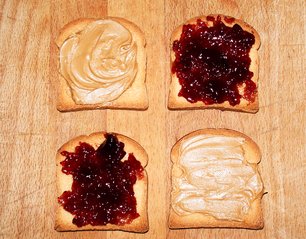Peanut Butter and Jelly, Long-Dead Warlords, and Procrastination
Let's have a moment's appreciation for the humble peanut butter and jelly sandwich. That most American of lunch bag staples, this classic combo has offered countless a momentary respite from the cruel world of schoolyard bullies. You can't always be sure that your recess will go unbothered, and you can't always be sure that your childhood tormentors will outgrow their sadistic tendencies, but at least that creamy peanut butter and sweet jelly is always there for you.
A simple comforting PBJ would surely have been welcomed by the soldiers in the army of ancient aspring warlord Xiang Yu. According to Dan Ariely in Predictably Irrational, by 210 B.C., Yu had moved his troops by ship to attack the formidable army of emperor Qin. (Qin was the kingpin of the Ch’in Dynasty, the one China is named after.) As you might imagine, Qin’s army was a pretty big deal, and when Yu’s men arrived on the banks of the Yangtze River, they were none too willing to engage. Yu, recognizing that his troop's procrastination could prove deadly, ordered all cooking pots destroyed.
Then he did the unthinkable: he burned all their own ships to ashes.
Then he did the unthinkable: he burned all their own ships to ashes.
Either Yu’s army would fight their way to victory or die trying. Retreat had ceased to be an option, as had procrastination. The story goes that Yu’s army in nine fierce battles defeated the main force of the Emperor. (Lucky for Yu, Boss's Day wouldn't become a holiday for another 2000 years, because I doubt he would've found himself on the recieving end of a lot of cards and floral arrangements.)
But when it comes to procrastination, most of us don’t have a homicidal warlord to make us toe the line. And if peanut butter and jelly are the inseparable dance partners of our lunchtime fare, then procrastination and cognitive dissonance are the brain's equivalent.
Our one billion neurons, equipped with a processing speed of up to 20,000 connections a second, give us the capacity to create an alternative universe. It's a whimsical place, often vastly different from the one with deadlines, tough bosses, and other vagaries of everyday life. There may be a real world out there, but cognitive dissonance allows us to make it more of a postal box than a permanent address.
So why do we have this capacity to slip the bounds of an external reality? One theory is that it gave our ancient ancestors a much-need break from their constant Escheresque nightmare world, where waking hours were spent chasing predators who were in turn chasing them.
Cognitive dissonance allowed them to believe they would survive the big hunt when the odds weren't always in their favor. Procrastination is built from that oh-so-optimistic bedrock. After all, you can't postpone something 'til tomorrow unless you believe a tomorrow will come. A "next time" is a kind of mental comfort food.
Unfortunately, in today’s world, procrastination can lead to a whole host of problems, including finishing a blog post on deadline. As I sit at my hotel room’s desk, chomping away on my sandwich, staring down at my computer screen, I am acutely aware of this problem. Lucky for me, there was a ruthless Chinese warlord to show me the way.
Unfortunately, in today’s world, procrastination can lead to a whole host of problems, including finishing a blog post on deadline. As I sit at my hotel room’s desk, chomping away on my sandwich, staring down at my computer screen, I am acutely aware of this problem. Lucky for me, there was a ruthless Chinese warlord to show me the way.
So after I finish my PBJ, I plan on smashing the lock on my hotel room door and setting fire to the hotel desk. This will force me to type for all I’m worth.
The alternative is just too much for my brain to contemplate.
The alternative is just too much for my brain to contemplate.
Check out Robb’s new book and more
content at www.bestmindframe.com.





Comments
Post a Comment